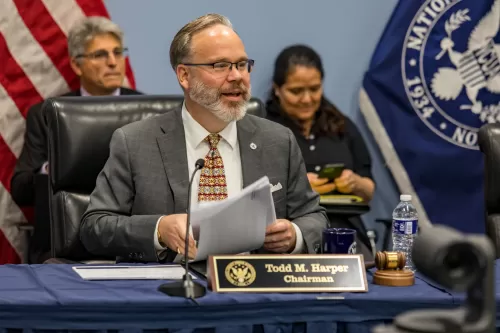NCUA Chairman Todd M. Harper during a public meeting at the NCUA's headquarters in Alexandria, Virginia.
As Prepared for Delivery on December 15, 2022
Thank you, Eugene and Jim, as well as the entire team in the Office of the Chief Financial Officer, for developing and finalizing the recommended 2023–2024 budget. I know that you all have lost track of the many hours spent to get to today’s final product. So, thank you.
Today’s 2023–2024 budget agreement would not be possible without the collaboration of my fellow Board members and their senior policy advisors — Sarah Bang and Lenwood Brooks. Their willingness to engage in good-faith discussions about our individual priorities helped us reach the consensus budget we are considering today. So, thank you as well.
There are many other individuals who contributed to today’s final budget agreement, including the outstanding team in Office of the Executive Director and every program office that participated in the NCUA’s annual budgeting process. So, thank you to the entire NCUA team.
The external stakeholders who spoke during our public budget hearing, provided written comment letters, or both were also an integral part of today’s agreement. Be assured that the NCUA staff and Board carefully reviewed and considered your comments and testimony and incorporated several budget-related suggestions into this final package. Other ideas will be reviewed in the year ahead.
As Eugene noted in his presentation, the recommended overall total budget — including the operating budget, the capital budget, and the Share Insurance Fund administrative budget — is $360.4 million and 1,214 positions. The total budget we are considering today is also almost 2 percentage points lower than the staff draft budget released in October. The number of new employees has also decreased from 25 to 18 positions, notwithstanding the inclusion of two additional positions in the new Office of Financial Technology and Access.
As part of approving the final 2023 budget, the Board will also approve a $15 million credit against the 2023 operating fee. With this credit, the average fees paid by federal credit unions will decline in 2023 by approximately 1.8 percent, the third consecutive year of declining fees.
Further, the combined budgets for 2024 are estimated at $403.2 million, with 1,240 staff positions.
As I noted earlier, the recommended budget before us today represents a consensus. It includes compromises by all of us at this table. Compared to the overall funding and staffing levels shown in the staff draft budget, this budget is now smaller in terms of dollars and staff. However, it is still a step in the direction of achieving the NCUA’s mission of protecting credit union members and consumers, maintaining the safety and soundness credit unions, and safeguarding the credit union system and the National Credit Union Share Insurance Fund.
Of great interest to me, this final budget includes two new fair lending specialist positions, as were previously proposed in the staff draft budget. Ensuring that credit unions are providing their members with safe, fair, and affordable financial products and services — free of discrimination — will lead to more wealth-building in the communities that need it the most.
Moreover, I am very supportive of the budget’s changes to field operations, including the creation of two new types of specialists, one for Bank Secrecy Act supervision and one for consumer compliance. These are sensible changes to improve our operations and will better allow us to supervise an increasingly complex credit union system.
Before wrapping up, I have one question about the Financial Transparency Act, which is likely to be enacted into law before the end of this year as part of the National Defense Authorization Act. As I understand, credit union trade associations have championed this legislation. Eugene, could you please explain what it will potentially cost the NCUA to implement this bill? Do you have an estimate as to how many additional employees will be needed to comply with the act?
Thank you, Eugene. I also understand that the legislation will require changes to the NCUA’s Call Reports. I’m laying this out now because it is a potential new cost that the NCUA will have to absorb and account for in 2023 and beyond. Yet, it is not part of the budget the Board will approve today. While there are good policy objectives behind this data transparency initiative, industry trade groups need to know that these changes will incur costs when the NCUA diligently implements the law they requested.
In conclusion, it was a pleasure to work with my fellow Board members, their senior policy advisors, and the agency’s budget staff to find common ground between all of us on the 2023–2024 budget. The budget strikes the right balance. It provides sound financial stewardship and will allow the NCUA to carry out its vital financial stability and consumer financial protection missions over the next two years.
That concludes my comments. I look forward to a productive and successful 2023, and I now recognize the Vice Chairman for his comments and questions.



